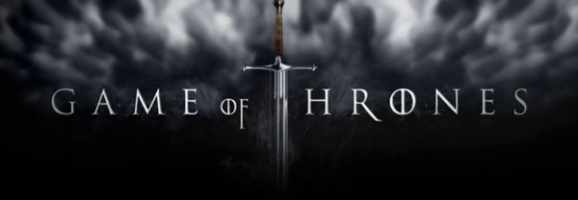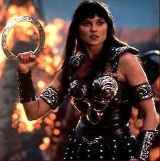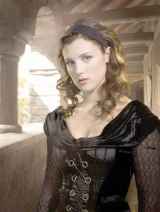Representations of Women in Television: A Feminist’s Dilemma

I am in a spot of bother, the midst of an ideological dilemma the likes of which I have not experienced since having to choose between Coco Pops and Fruit Loops.
You see, I self identify as a feminist. The rights and representations of women in everyday life as well as in popular culture are concepts that live very close to my heart (heart adjacent, if you will). I am often on the receiving end of backlash from both friends and strangers, arguing that feminism is unnecessary, that equality has been achieved, that burning my bra in a public setting is a fire hazard. However, as much as that is unsettling to me, that isn’t the problem I am facing at the moment.
As an amateur television critic and academic, I focus heavily on the representations of women in popular culture, as well as how feminist concepts are worked-through in the televisual sphere. As such, I am the Queen of Nitpicking; I see things that others don’t, and then I overanalyse them. It is, I have on fair authority, extremely annoying. However, it has a purpose. Nitpickers find trends, gaps, or silences within the media and shine a spotlight on them so that any imbalances or ideological discrimination can be fixed or eliminated. My eyes and ears are fine-tuned to perk up like a meerkat, particularly when confronted with misogynistic portrayals of femininity.

A particularly egregious example was the last series of Masterchef Australia, creatively titled Boys vs. Girls. One need not go past the advertisements to see the outrageous stereotypes. In one thirty-second spot, you have women claiming to be ‘the perfect 1950’s housewife’ and arguing that ‘women are just naturally better at cooking and multitasking’. Don’t even get me started on the pseudo-sexual imagery of the boys-with-baguettes/women-with-oven-mitts. This, though, isn’t my problem. Well, not the big one anyway. This is the sort of outlandish sexism that is noticed by the press and by the general public, and so its negative effects are reduced through exposition.
My problem, my unsolvable problem, lies with shows such as Game of Thrones, Xena, The Pillars of the Earth and Robin Hood. Starting with the first two, I want to focus on the characters of Xena (Lucy Lawless) and Brienne of Tarth (Gwendoline Christie). These characters are remarkably similar, with both being strong, independent women who live within a fantastic, pseudo-historical realm that is hostile to female power. Both are valorised as heroes (in Thrones that is a dangerous place to be) and earn the grudging respect of many of the men that they encounter on their journeys. They are, however, privileged predominantly because of their masculine traits. They stand out because of their ability to fight, drink and (in Xena’s case) sleep around like men. This is a distinctive aspect of second-wave feminism, where femininity was often demonised as a socially constructed oppressor of women. While Xena retains the beauty that Brienne is denied, even that is compromised.

Somehow, I don’t think a leather netball skirt will protect her from sword to the thigh (or an arrow to the knee), and thus her armour serves not as a reminder of femininity so much as an indicator of her status as a sexual object. Basically, these women are valorised and popularised because they act like men. This, in turn, suggests that femininity itself is weak.
What’s my problem then? If I don’t like the characters, I can just turn the television off. Is it that I can’t watch television anymore because of this phenomenon? Is it because I get so angry I throw things and break the screen? No. It’s because I love these characters. When I watch those shows, any thoughts of feminism tend to fly out of my head in favour of watching Brienne go full American Psycho on three Stark soldiers. I can’t focus on how Xena is a sexualised object while she is PUNCHING SEXISM IN THE FACE. These women represent an outdated form of empowerment that, in actuality, demonises and minimises the importance of femininity; and yet, I can’t stop adoring them. That is, however, only half of my problem.
The Pillars of the Earth is a miniseries set in early medieval England; based on the Ken Follett novel of the same name. I want to talk about the main female character, the Lady Aliena. She begins life rich and comfortable, but a series of unfortunate circumstances leave her, and her brother, all but penniless. Her brother is useless (pretty, but useless), and thus she takes it upon herself to start what will become a thriving wool business. She is representative of the feminist spirit, in that she transcends the stifling bonds of patriarchy and becomes a success in her own right, supporting her brother and winning the hearts and minds of the once-sceptical township.

Robin Hood‘s Marian is of similar fare, as she defies her father’s wishes and masquerades about town as the vigilante Night Watchman. Marian is also feisty, often questioning why her status as a female precludes her from participating in the escapades of Robin Hood. Both Marian and Aliena are beautiful and powerful, as well as resourceful; they are near-perfect characters. I thoroughly dislike them.
I’m not going to mention the historical anachronism; the fact that this level of post-feminist discourse was hardly evident in the Middle Ages is neither here nor there. The problem is, Aliena and Marian were designed specifically with the post-feminist in mind. They have the exact right balance of femininity and feminism in order to be palatable to a large female audience; in truth, they are outstanding role models. Unfortunately, they don’t feel real. The problem with many post-feminist representations of women is that they look and feel constructed. In fan-fiction, this is termed a Mary-Sue, when a character is introduced into the narrative (usually as a love-interest) that somehow ‘solves’ the main narrative plot through her perfection. How am I supposed to relate to the perfect woman? I’m female; I’m sociologically positioned to see other women as a threat! In addition to this constructed nature, the audience is positioned to side with the women on feminist grounds regardless of whether the argument has substance. For example, Robin Hood privileges Marian’s wish to be more involved in political affairs and outlaw escapades, yet her inexperience in either field would inevitably make her an inefficient inclusion. My main gripe here is that the show asserts that she should be included because she is a woman, not because she has the experience or knowledge to be useful.

So, there is my problem. The characters I am supposed to be offended by are remarkable; while the ones made specifically to please me are boring at best and offensive at worst. I can’t even blame television- the ‘perfect woman’ represented by Marian and Aliena was born from feminist resentment of the masculinity of Xena and Brienne. Effectively, people like me have created my problems. What is a girl to do?
I know what you are thinking: turn off the sexism Spidey-senses when it comes to television. If I am not thinking about the effect that negative or unattainable female representations have on society, then I won’t have a problem, right? Unfortunately, I can’t just turn it off; it’s a part of who I am. I’ve trained for years to spot misogyny; I am unable to stop now. It’s like telling a leopard to change its spots, or a Lannister to not pay a debt. Impossible.
I said at the beginning of the article that there was no answer to be found, and I was telling the truth. There can never be a perfect representation of women, because she would be imperfect due to her perfection. In addition, even if I thought a character was exactly how I wanted a female to be portrayed, there would be a thousand others who would disagree. However, one positive we can take from this is that representations are always changing. The producers and writers of television are, at least some of the time, thinking about how they are portraying women. There will be no right answer; there is no final copy of women- we just have to keep marking the drafts.
Now, if you will excuse me, I have to go watch Brienne of Tarth fight a bear.
What do you think? Leave a comment.











I would like my granddaughters to see POWERFUL women who do not need to expose skin to attract men and who do not need male attention (as sexual objects) to be validated. The images of women (including magazines vending fashion) still have women in high heels as sexy…..shoes in which they cannot run away very fast and in which they cannot deliver really lethal KICKS. So….= men still need women to be WEAKENED in order to feel comfortable and powerful in their company, and media is still playing to that. (In my view, of course, such men are stunted in their emotional development and….extremely pathetic.)
If you need something good for your daughter to watch whose main character is a female of power, have them watch Legend of Korra.
I don’t now if I can completely agree with you there – Korra may be a strong character, but almost half the series seems to focus on her romantic escapades. I would be more likely to suggest Katara and Toph as powerful female characters, and not to mention a powerful disabled female character.
Tell me more, please.
Every time I see a woman using her wiles instead of her brains, it truly turns me off no matter how smart she might be.
Men are generally the producers and writers for these shows, but still, I think you have a point. Compeltely agree about Xena and encourage this type of show. In reality, if women would stop watching trash like the Real Housewives, the lack of demand would force more shows like Game of Thrones or Homeland (!) into the spotlight.
most liberals would consider the amount of male writers on television discrimination, despite not having a clue as to how the industry works. it’s their default accusaiton.
What are the percentages of male writers to female writers? People tend to write what they know.
This is the reason I love Sons of Anarchy. The women’s characters vary from a surgeon to a porn star.These are written very well and have some of the strongest story lines in the show. Don’t tell me it can’t be done – Kurt Sutter & his team can do it.
I often find that American television spends too much time celebrating female stupidity in leading roles – Two Broke Girls, New Girl, Sex in the City (come on these women aren’t that bright, or well dressed IMO). Or, the female leads are masculinised, at the very least in that they need to wear a suit to be taken seriously. I totally agree that SOA does showcase powerful women in a lot of interesting ways though!
Does not being well dressed equate to being stupid…? ; )
I haven’t seen most of these shows, but I can comment on Game of Thrones at least. Sure, Brienne is seen as powerful and earns respect because of her masculine-like qualities, but by saying she is the ONLY female character who is respected on that show because of her masculinity is doing an injustice to all the other female characters. Melisandre and Cersei and Catelyn are all quite feminine, but they are equally powerful and the men are at times just as fearful of them as they would be of Brienne. They are powerful in a more subtle way; they work behind the scenes, they use their sexuality to get things done, and why shouldn’t they? Same with Daenerys. She’s not physically strong, but she has armies upon armies of men ready to fight for her because of other traits she possesses (not sexuality in this case, but kindness and compassion and an interior strength). She is respected, and not for any masculine traits she shows. I think GOT has some of the best women in television and they are all strong in some sense -even Sansa. Brienne has one form of power in her physical capabilities, but she is not seen as the sole strong female character because of this physicality. I actually think she’s emotionally quite vulnerable, unlike a lot of the other women, and has some weakness in that regard.
Interesting article. It was worth reading as it made me think a bit more about how female characters tend to be portrayed and how I haven’t given it as much thought as I probably should because I’m too busy watching them fight bears. (Not that I watch that much TV any more)
why do we have to keep propping up women? it’s 2014, if they want strong characters, they can write or direct them. television degrades men to twice the degree they degrade women, and women do not have to deal with 1/100th of the violence that men endure. when i watch television, whether the woman is a secretary or a doctor makes no difference.
Then you’re lucky, Tharp. When I tune in to TV (or a book, movie, music…) and the women are just sexualised gadgets (I’m thinking of the armor, too, Kathryn), I’m out. And I disagree that white, heterosexual men are degraded: there are far more men in varied parts in media than women. Violence isn’t the worst thing — being portrayed as an idiot w/ breasts is worse.
I couldn’t agree more. My fiance and I both love movies and we love to watch or go to the theater to see them. I usually try to get caught up in the storyline, plot, and characters, but since I was first introduced to the idea of feminism, I can’t help but notice the annoying, sexualized way that women are often portrayed in films. It is so obvious that Hollywood is an industry run by men. I was just discussing this with someone the other day, when he mentioned that he would be angry if he was a woman because of the way that women are portrayed on screen.
I agree, I also find that I can’t watch TV and movies the same way that I used to since learning about feminist issues. It’s a double edged sword- on one hand, my eyes have been opened to the glaringly obvious sexist portrayals of women, and on the other hand I can’t enjoy these shows without seeing them, which distracts me from the story.
And so males are portrayed as stupid, immature, selfish and doltish. Let’s face facts. Television is a wasteland.
Men and women are different in very specific ways mentally, emotionally, and physically because they were designed to be partners that help each other. But gender differences nowadays are only emphasised WHEN they are sexualised because of intense sensitivity to “equality”.
You know the fact is we are entertained by things that flirt with our FANTASIES more than things that match up to reality.
The second paragraph is particularly valuable when these two things are not aligned with each other. One reason for quite a few problems today.
I really enjoyed your article!
I’m always torn when it comes to the word feminism because it is so closely tied with the idea of “anything you can do I can do better.” But, and forgive me if this is an unpopular opinion, do women really have to better than men? And what I mean by that is, can’t everybody just do their very best without the need to compete? The problem I have with these modern “warrior-type” characters is that, like you said, they must take on manly qualities in order to be taken seriously.
Men and women are different. There are things that men can do that women are not as good at BUT there are also things that women can do that men cannot do which merit equal credibility. What is wrong with the gentle leadership characteristics that women have? Granted, not every woman is the same and I think this is where the problem lies. When a woman IS gentle and quiet, people accuse her as setting feminism back five hundred years. I guess what I’m trying to say is that true femininity is complimentary to true feminism. And I wish there were more characters who encompassed this idea in modern day media.
TV is a fantasy land and people should be made aware that the representations there are not real. TV will show whatever people watch. If shows with executive women get ratings then there will be more of them.
I would personally watch a show featuring a strong, self-assured, confidant woman. I think House did a good job of mixing sexy with strong, cute with cunning…)
I believe this is in part because of how we are raised as a society. Even though women have come a way, they are still far from equal. I mean, women are still paid less than men to this day. I believe we grow up believing somethings are good and bad and one of those things that are learned along the way is how we view others. I would love media showing strong, successful, confident women. They are my role models.
I believe that sometimes men are looked at differently than women in power fields because we always assume that she wants kids or something similar. I don’t think that is right. I think sometimes that girls want to feel invincible and most of the super heroes they grew up with were men. And as a result, they want to seem manly.
I really enjoyed this article! Feminism is always quite a hot-topic.
My only issue with this type of thinking is the fact that these warrior-types are problematized because they display mainly “masculine” characteristics. Are the abilities to fight, drink and sleep around inherently masculine? Perhaps they are emphasized more with men, but surely these are traits that can be associated with most women as well. I know it’s a two-way problem, as some men who are emotional or tender are labeled “feminised”. Society shouldn’t place gender labels on any human characteristics.
Xena doesn’t fight and drink like a man. She fights and drinks like a tough chick.
I fully agree on the sexualisation of women though. It’s completely ridiculous!
Like many people who have already commented, I also agree wholly with this article – more power to feminism! It is true that there is no perfect presentation of the female, but representation is key. I would love to see lots and lots of women, overweight and obese women, old women, funny women, lesbians, asexual women, bisexual women (though of course not just represented for their sexuality) – I want to see lots of women who don’t fit the norm, because it seems to me that women that fit this “norm” only exist within the media.
I really appreciate the idea that feminist characters shouldn’t be perfect. Realistic characters have flaws despite the strongest desire to be politically correct. Great reminder.
This is a really interesting article which raises some key issues about the polarised representations of women in TV. I think your argument is particularly relevant because the TV shows mentioned are all based in a different era/world to ours. Thus, one has to wonder whether it would have been realistic for a character like Brienne to hold such a prominent role as an armed guard… despite the fact that her strength defies notions of female passivity. Are these attempts to ‘satisfy the feminists’ problematic in themselves?
“How am I supposed to relate to the perfect woman? I’m female; I’m sociologically positioned to see other women as a threat!”
This is the only comment that I took issue with in this article. You do a very good job of explaining your rationale for things, pointing out misogyny, etc., I get that. However, with this comment, it feels like you’re using it (misogyny) as an excuse not to see or relate to these characters. I understand what you mean, but I too am nitpicky; if you can work on pointing it out in others, it’s always good to work on pointing it out in yourself, too.
All in all, your conclusion paragraph sums it up. No one will ever be happy with a female character; let’s all go watch our favorites. Good job.
Xena is a sexualised object because of her armor?
It was 3000 years ago. Greek men wore the same type of armor. Spartans wore even less. The ignorance. This is all so very very stupid.
Hi, I’m the author of this article. The point shot I am trying to make wine the armour is the in terms of shape it emphasises the breasts and legs of the actress and sexualises her quite obviously. This would not be as concerning if there was a practical protective aspect to the armours, but outlining the breasts (for example) only serve to highlight their presence, not protect her. Not only is the heart exposed, if she was hit In that area, the particular moulding could crack her breastbone. Whilst ‘Spartans may have worn less’ they didn’t have armours that perfectly outlined their privates and only served to emphasis their crotch.
I hope I have adequately explained what my initial point was. Although, considering the inflammatory and insulting tone of your comment, I’m not sure if any level of explanation would be of use to you.
Kathryn, it’s many years on since you posted, but I enjoyed your article and the feedback from your audience, so felt compelled to leave a reply. The pointless sexualisation of women just for titillation diminishes the quality of films etc. I view them as vehicles for money making and nothing else. But, they demean both men, and women. Women in skin-tight outfits, high heals, breast and bum padding, run along the roof tops, while men are promoted as heroes, head to toe with muscles whilst being promoted for being aggressive. Fantasy land. I do think that on the whole woman bear the worsed of it, but men can be overly masculinised too. We’ve got a lot evolving to do and debates like this can only be beneficial. I’d be interested to read more of your work.